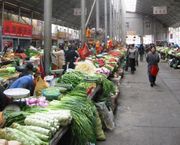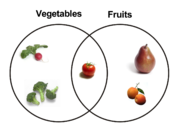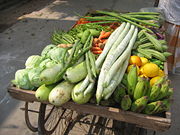Vegetables & Fruits
The term "vegetable" generally refers to the edible part of a plant. The definition is traditional rather than scientific. It is somewhat arbitrary and subjective, as it is determined by individual cultural customs of cooking and food preparation. more...
Normally, any herbaceous plant or plant part which is regularly eaten as food by humans would be considered to be a vegetable. Mushrooms, though belonging to the biological kingdom Fungi, are also generally considered vegetables in the retail industry. Nuts, seeds, grains, herbs, spices and culinary fruits (see below), are not normally considered to be vegetables, even though they are all parts of plants.
In general, vegetables are regarded by cooks as being suitable for savory or salted dishes, rather than sweet dishes, although there are many exceptions, such as pumpkin pie and rhubarb crumble. Some vegetables, such as carrots, bell peppers and celery, are eaten either raw or cooked; while others, such as potato, are traditionally eaten only when cooked.
Is it a fruit or a vegetable?
The word "vegetable" is a culinary term, not a botanical term. The word "fruit" on the other hand can be a culinary term or a botanical term.
Botanically speaking, fruits are fleshy reproductive organs of plants, the ripened ovaries containing one or many seeds. Thus, many botanical fruits are not edible at all, and some are actually extremely poisonous. In a culinary sense however, the word "fruit" is only applied to those botanical fruits which are edible, and which are considered to be a sweet or dessert food such as strawberries, peaches, plums, etc.
In contrast to this, a number of edible botanical fruits, including the tomato, the eggplant, and the bell pepper are not considered to be a sweet or dessert food, are not routinely used with sugar, but instead are almost always used as part of a savory dish, and are salted. This is the reason that they are labeled as "vegetables".
A plant part may scientifically be referred to as a "fruit", even though it is used in cooking or food preparation as a vegetable.
The question "The tomato: is it a fruit, or is it a vegetable?" found its way into the United States Supreme Court in 1893. The court ruled unanimously in Nix v. Hedden that a tomato is correctly identified as, and thus taxed as, a vegetable, for the purposes of the 1883 Tariff Act on imported produce. The court acknowledged that botanically speaking, a tomato is a fruit.
Etymology
Vegetable is also used as a literary term for any plant: vegetable matter, vegetable kingdom. It comes from Latin vegetabilis (animated) and from vegetare (enliven), which is derived from vegetus (active), in reference to the process of a plant growing. This in turn derives from the Proto-Indo-European base *weg- or *wog-, which is also the source of the English wake, meaning "not sleep". The word vegetable was first recorded in print in English in the 14th century. The meaning of "plant grown for food" was not established until the 18th century.
Read more at Wikipedia.org




